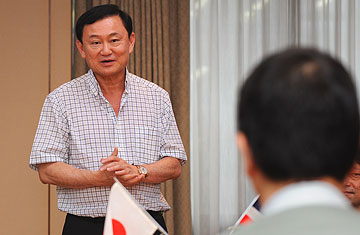
Thailand's fugitive former Prime Minister Thaksin Shinawatra, left, meets with Yoshihiro Murai, governor of Japan's Miyagi prefecture, in Sendai on Aug. 25, 2011
(2 of 2)
Thaksin's trip was ill timed but unsurprising. He has loomed large over Yingluck's short political career, which only began in May after the former telecom CEO was chosen to lead Pheu Thai (For Thais), a party widely assumed to be run and funded by Thaksin. "Yingluck is my clone," he said then. Pheu Thai comfortably won a July general election, thanks to Yingluck's common touch on the campaign trail and the enduring popularity of her brother. Thaksin still commands huge support in Thailand, mainly among the rural poor, who say their lot improved during his five years as Prime Minister. The urban middle classes and the royalist, military-back elites — the Democrat Party's natural constituency — still despise him for his corruption and authoritarianism.
Bridging this political divide was one of Yingluck's avowed priorities, but the visa scandal threatens to derail reconciliation efforts before they have even begun. "It's damaging for Yingluck," says Paul Chambers, a political scientist at Payap University in Chiang Mai. "Now the opposition can say, 'You're not interested in reconciliation. You're just interested in helping your brother.'"
Yingluck seems aware of the damage. "Voters won't allow me to work for only one person," she has said. Polls certainly back this up. Thaksin should stop meddling, avoid politics and let his sister do her job, according to two-thirds of 2,193 Thais questioned in a recent survey by Bangkok's Assumption University. Any attempt to pardon or repatriate Thaksin could regalvanize anti-Thaksin street protesters, who in 2008 occupied the Prime Minister's office and shut down Bangkok's airports.
It would also antagonize Thailand's powerful military. Its generals have remained silent of late — conspicuously so in the case of Prayuth Chan-ocha, the gaffe-prone army chief. General Prayuth helped topple Thaksin in 2006 and his loathing for Pheu Thai is one of the country's worst-kept secrets. But with October's annual military reshuffle approaching, Prayuth is currently preoccupied with resisting attempts by Yingluck's government to promote pro-Thaksin officers. "Prayuth and others are waiting until the reshuffle is complete," says Chambers. "Then I think they'll become much more vocal in their opposition to this government."
Thaksin wasn't the only Shinawatra hogging Yingluck's limelight this week. Two days after he landed in Tokyo, Thaksin's ex-wife Pojaman was acquitted by a court in Bangkok in an appeal against her three-year jail sentence for tax evasion. The chances of Thaksin's 2008 conviction being overturned remain remote, as does an imminent Thai homecoming. But years of exile have turned him into a patient strategist. Chambers speculates that Yingluck (or her brother) chose a "colorless bureaucrat" like Surapong as Foreign Minister so that a globetrotting Thaksin could shine as Thailand's pre-eminent statesman. Problem is, he also threatens to outshine his sister, whose first performance in parliament was tepid and unconvincing.
Pre-eminence abroad could win over enemies at home. "Thaksin wants to prove his innocence to the Thai public by showing that he's accepted by the international community," says Kan Yuenyong, executive director of the Siam Intelligence Unit, a Bangkok think tank. For now, Thaksin's long exile continues, albeit with VIP status. Expect him to make the most of it.
